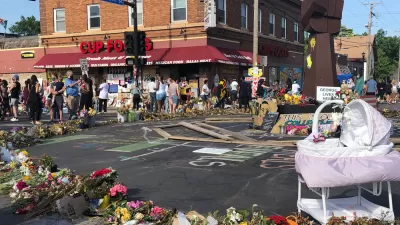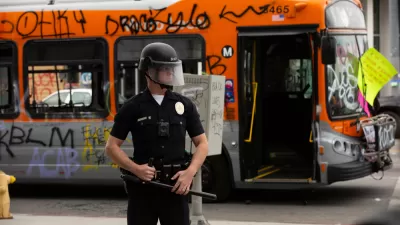In Nick Demarsh and Rick Banks' opinion, defunding the police requires cities to reconsider car culture.

Nick Demarsh and Rick Banks say that the conversation about police defunding or abolition requires consideration of the role of the personal vehicle in American life. On average, police spend 15% of their time on traffic enforcement, they say. Investing in infrastructure that could reduce the need for traffic enforcement is a great step toward divesting from police and avoiding situations that are disproportionately dangerous for Black and brown Americans, opine Demarsh and Banks:
If we understand the relation of policing and cars and the antidote – public transit – re-investing funding from police agencies to transit systems demonstrates a possible remedy to the dual threat of violence from policing and cars. By transitioning resources from police departments to transit agencies, cities could both reduce the need to protect communities from reckless driving and increase racial equity in our cities.
The article draws a poignant connection between increase in policing and the mass incarceration of the prison industrial complex. Similarly, Demarsh and Banks point to the rise of the personal vehicle as an ultimate source of police enforcement hours and the construction of freeways as destructive forces in communities of color.
sets out a reminder of this history of police by the desire to enforce mass incarceration and the prison industrial complex, drawing connections between the rise of the police force with the rise of the personal vehicle.
"Understanding the history of the growth of policing during the rise of the car provides important insight for our discussion about the role of policing today," remind Demarsh and Banks, arguing for the allocation of police budget to public transit investment.
Recognizing the potential of increased policing on transit (ACLU found that 9 of 10 Cleveland BRT Healthline stops were of Black riders), Demarsh and Banks suggest that free fare could reduce the need for police and be funded by police department budgets.
FULL STORY: Can We Abolish the Police Without Challenging the Status Quo of Car Culture?

Planetizen Federal Action Tracker
A weekly monitor of how Trump’s orders and actions are impacting planners and planning in America.

Maui's Vacation Rental Debate Turns Ugly
Verbal attacks, misinformation campaigns and fistfights plague a high-stakes debate to convert thousands of vacation rentals into long-term housing.

Restaurant Patios Were a Pandemic Win — Why Were They so Hard to Keep?
Social distancing requirements and changes in travel patterns prompted cities to pilot new uses for street and sidewalk space. Then it got complicated.

In California Battle of Housing vs. Environment, Housing Just Won
A new state law significantly limits the power of CEQA, an environmental review law that served as a powerful tool for blocking new development.

Boulder Eliminates Parking Minimums Citywide
Officials estimate the cost of building a single underground parking space at up to $100,000.

Orange County, Florida Adopts Largest US “Sprawl Repair” Code
The ‘Orange Code’ seeks to rectify decades of sprawl-inducing, car-oriented development.
Urban Design for Planners 1: Software Tools
This six-course series explores essential urban design concepts using open source software and equips planners with the tools they need to participate fully in the urban design process.
Planning for Universal Design
Learn the tools for implementing Universal Design in planning regulations.
Heyer Gruel & Associates PA
JM Goldson LLC
Custer County Colorado
City of Camden Redevelopment Agency
City of Astoria
Transportation Research & Education Center (TREC) at Portland State University
Jefferson Parish Government
Camden Redevelopment Agency
City of Claremont





























